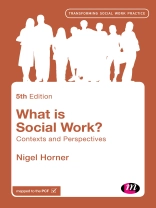Following the lives of four fictional time-travelling characters, it examines the changing functions of social work by unpicking the changing social and political responses to their needs. From its historical roots to the modern and fast-moving profession it has become, this book looks in detail at how social work has evolved as a profession, what social work looks like in recent years and where it is heading. There are key chapters on working with different service user groups including vulnerable adults, children and families and those with learning difficulties or having to live with mental distress. There are also chapters that cover social work as a profession, including current services, practices, themes and debates.
Innehållsförteckning
Chapter 1: Introduction and core themes
Chapter 2: The beginnings of social work: ’The comfort of strangers’
Chapter 3: Social work with children, young people and families
Chapter 4: Social work with people with learning difficulties
Chapter 5: Social work with people experiencing mental distress
Chapter 6: Social work and older people
Chapter 7: Formalising and consolidating social work as a profession
Chapter 8: Current services, practices and issues
Chapter 9: Summarising remarks and signposts
Appendix 1: Professional Capabilities Framework
Appendix 2: Subject Benchmark for Social Work
Appendix 3: A code of ethics for social work (BASW) values and principles
Appendix 4: Mapping services in modern social work and social care settings
Appendix 5: Time line of the development of social work
Appendix 6: Summary of recommendations from the Munro Report
Appendix 7: The standards of proficiency for social workers in England and the Professional Capabilties Framework
Appendix 8: Building a Safe and Confident Future (July 2009)
Resources and useful websites
Om författaren
Nigel Horner is Head of the School of Health and Social Care at the University of Lincoln, where he teaches social work history, theory and methods, residential child care and ageing and older people. He began working in a London Borough Children’s Home in 1972, before studying Sociology at Durham University. After a period as a Community Worker, he qualified in Social Work from Glasgow University in 1980, and thereafter worked in Mental Health, Child and Adolescent Mental Health Services, Fostering and Youth Offending settings. He is also a Senior Fellow in the Higher Education Academy.












